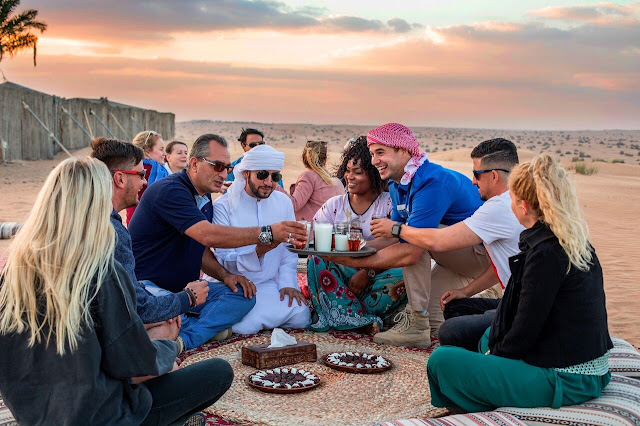Dubai's culture is a captivating blend of tradition and modernity, where ancient customs coexist harmoniously with contemporary influences. As you immerse yourself in this dynamic city, understanding the cultural nuances will enrich your experience and interactions. In this insightful blog post, we'll take a deep dive into the culture of Dubai, exploring its values, traditions, and the vibrant tapestry that makes it unique.
Hospitality and Warmth:
1. Welcoming Spirit:
Dubai is renowned for its warm and generous hospitality. Locals and residents alike embrace visitors with open arms, making you feel at home in this cosmopolitan city.
2. Coffee Tradition:
Partake in the traditional Arabic coffee ceremony, where you're offered aromatic coffee (qahwa) and sweet dates as a gesture of welcome and respect.
Cuisine and Gastronomy:
3. Culinary Delights:
Dubai's culinary scene is a fusion of flavors from around the world. Indulge in traditional Emirati dishes, as well as international cuisines that reflect the city's diverse population.
4. Ramadan Traditions:
During the holy month of Ramadan, be respectful of fasting Muslims by refraining from eating, drinking, and smoking in public during daylight hours.
Dress Codes and Modesty:
5. Modest Attire:
While Dubai is a modern city, dressing modestly is appreciated, especially in public places and cultural sites. Covering shoulders and knees is generally advised.
6. Traditional Attire:
Embrace the opportunity to wear traditional Emirati attire, such as the abaya for women and kandura for men, during cultural events or while visiting heritage sites.
Festivals and Celebrations:
7. Cultural Festivals:
Dubai hosts a variety of cultural festivals that showcase the city's diverse heritage, including the Dubai Shopping Festival and the Dubai Food Festival.
8. Eid Celebrations:
Participate in the vibrant celebrations of Eid Al Fitr and Eid Al Adha, which mark the end of Ramadan and the annual Hajj pilgrimage respectively.
FAQs:
Q: Can tourists participate in local cultural festivals?
A: Yes, tourists are welcome to join in the festivities of cultural events and festivals, providing an opportunity to experience Dubai's rich traditions.
Q: Is there a dress code for beachwear in Dubai?
A: While beachwear is acceptable at designated beach areas and resorts, it's important to dress modestly when moving outside these areas.
Q: Are there specific customs to follow when visiting someone's home?
A: Removing your shoes before entering someone's home is a common custom, as it reflects a sign of respect and cleanliness.
Q: Can I take photographs of locals without permission?
A: It's courteous to ask for permission before taking photographs of locals, as a gesture of respect for their privacy and culture.
Conclusion:
Dubai's culture is a harmonious blend of old-world traditions and modern innovations. By embracing its warm hospitality, respecting local customs, and participating in cultural events, you'll gain a deeper appreciation for the city's vibrant cultural tapestry. From savoring diverse cuisines to celebrating traditional festivals, immersing yourself in Dubai's culture is an enriching journey that allows you to connect with both its heritage and its aspirations for the future.

